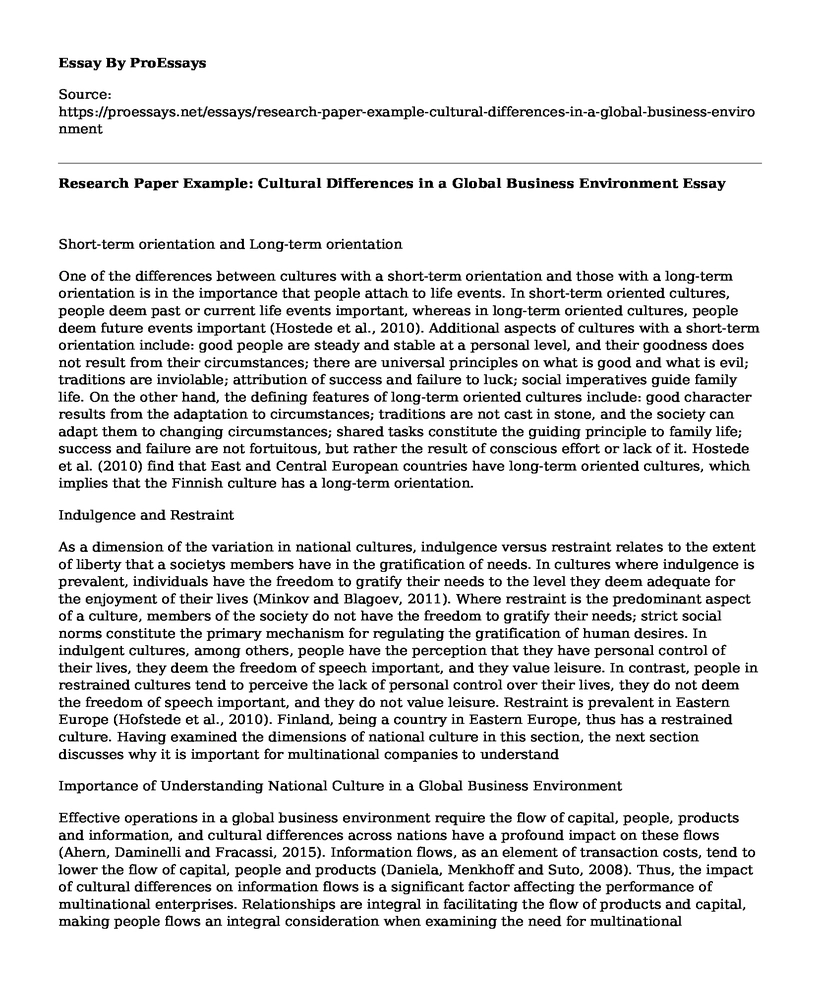Short-term orientation and Long-term orientation
One of the differences between cultures with a short-term orientation and those with a long-term orientation is in the importance that people attach to life events. In short-term oriented cultures, people deem past or current life events important, whereas in long-term oriented cultures, people deem future events important (Hostede et al., 2010). Additional aspects of cultures with a short-term orientation include: good people are steady and stable at a personal level, and their goodness does not result from their circumstances; there are universal principles on what is good and what is evil; traditions are inviolable; attribution of success and failure to luck; social imperatives guide family life. On the other hand, the defining features of long-term oriented cultures include: good character results from the adaptation to circumstances; traditions are not cast in stone, and the society can adapt them to changing circumstances; shared tasks constitute the guiding principle to family life; success and failure are not fortuitous, but rather the result of conscious effort or lack of it. Hostede et al. (2010) find that East and Central European countries have long-term oriented cultures, which implies that the Finnish culture has a long-term orientation.
Indulgence and Restraint
As a dimension of the variation in national cultures, indulgence versus restraint relates to the extent of liberty that a societys members have in the gratification of needs. In cultures where indulgence is prevalent, individuals have the freedom to gratify their needs to the level they deem adequate for the enjoyment of their lives (Minkov and Blagoev, 2011). Where restraint is the predominant aspect of a culture, members of the society do not have the freedom to gratify their needs; strict social norms constitute the primary mechanism for regulating the gratification of human desires. In indulgent cultures, among others, people have the perception that they have personal control of their lives, they deem the freedom of speech important, and they value leisure. In contrast, people in restrained cultures tend to perceive the lack of personal control over their lives, they do not deem the freedom of speech important, and they do not value leisure. Restraint is prevalent in Eastern Europe (Hofstede et al., 2010). Finland, being a country in Eastern Europe, thus has a restrained culture. Having examined the dimensions of national culture in this section, the next section discusses why it is important for multinational companies to understand
Importance of Understanding National Culture in a Global Business Environment
Effective operations in a global business environment require the flow of capital, people, products and information, and cultural differences across nations have a profound impact on these flows (Ahern, Daminelli and Fracassi, 2015). Information flows, as an element of transaction costs, tend to lower the flow of capital, people and products (Daniela, Menkhoff and Suto, 2008). Thus, the impact of cultural differences on information flows is a significant factor affecting the performance of multinational enterprises. Relationships are integral in facilitating the flow of products and capital, making people flows an integral consideration when examining the need for multinational enterprises to understand differences in national culture when going global. This section will begin by discussing how cultural differences affect information and people flows, after which an exploration of other facets of the link between culture and global business performance will follow.
Impact of cultural differences on people, information and product flows
Linguistic differences provide useful insight into the cultural differences between countries. Language barriers can be an impediment to information flows. Looking at how the length of inter...
Cite this page
Research Paper Example: Cultural Differences in a Global Business Environment. (2021, Apr 05). Retrieved from https://proessays.net/essays/research-paper-example-cultural-differences-in-a-global-business-environment
If you are the original author of this essay and no longer wish to have it published on the ProEssays website, please click below to request its removal:
- Right to a Family and Private Life
- Report Example on the Best Western Group of Hotels
- Debate on Globalization
- Essay Sample on Social Impact of Business
- Essay Sample on Industrialization's Impact on Environment: The Global Challenge of Contaminants
- Paper Example on Japanese Imperium: Selfishness Over Diplomacy in East Asia
- Child Maltreatment - Report Sample







